An In-Depth Analysis of Organizational Behavior Within the BBC
VerifiedAdded on 2020/10/22
|18
|5394
|148
Report
AI Summary
This report provides a comprehensive analysis of organizational behavior within the British Broadcasting Corporation (BBC). It begins by applying Handy's cultural typology to assess the BBC's organizational culture, addressing issues such as bullying, harassment, and staff complaints. The report then explores the influence of culture, politics, and power on employee behavior, highlighting the need for restructuring and improved power distribution. Furthermore, it examines various motivation theories, including Hertzberg's and Maslow's models, to enhance employee working efficiency and morale. The analysis extends to the different types of teams within the BBC, evaluating their effectiveness through Tuckman and Jensen’s model, and proposes the organizational path-goal theory to boost team performance. The report concludes by emphasizing the importance of addressing barriers to effective performance and the relevance of team development theories in fostering dynamic cooperation. This study provides actionable insights for the BBC's HR department to improve its organizational structure and employee satisfaction.
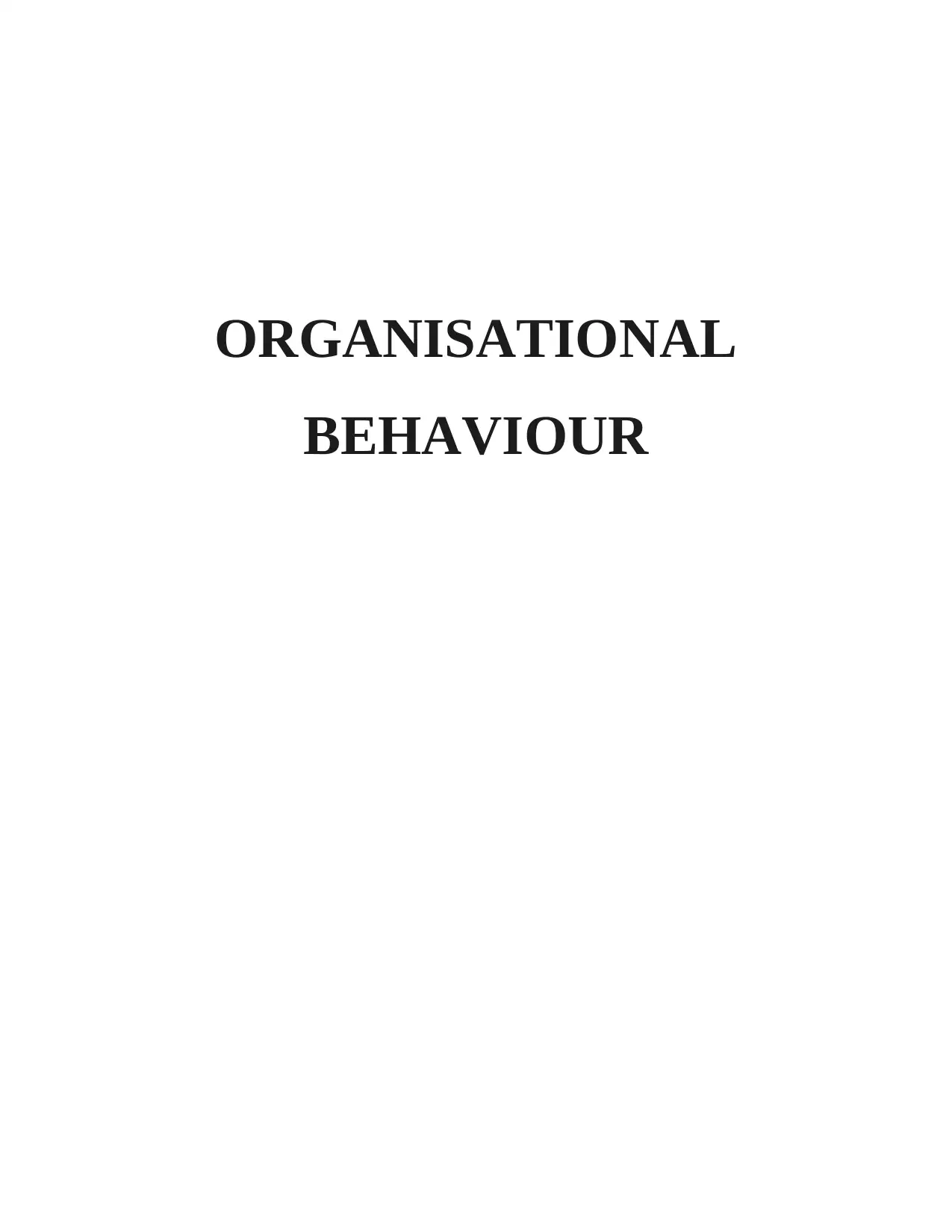
ORGANISATIONAL
BEHAVIOUR
BEHAVIOUR
Paraphrase This Document
Need a fresh take? Get an instant paraphrase of this document with our AI Paraphraser
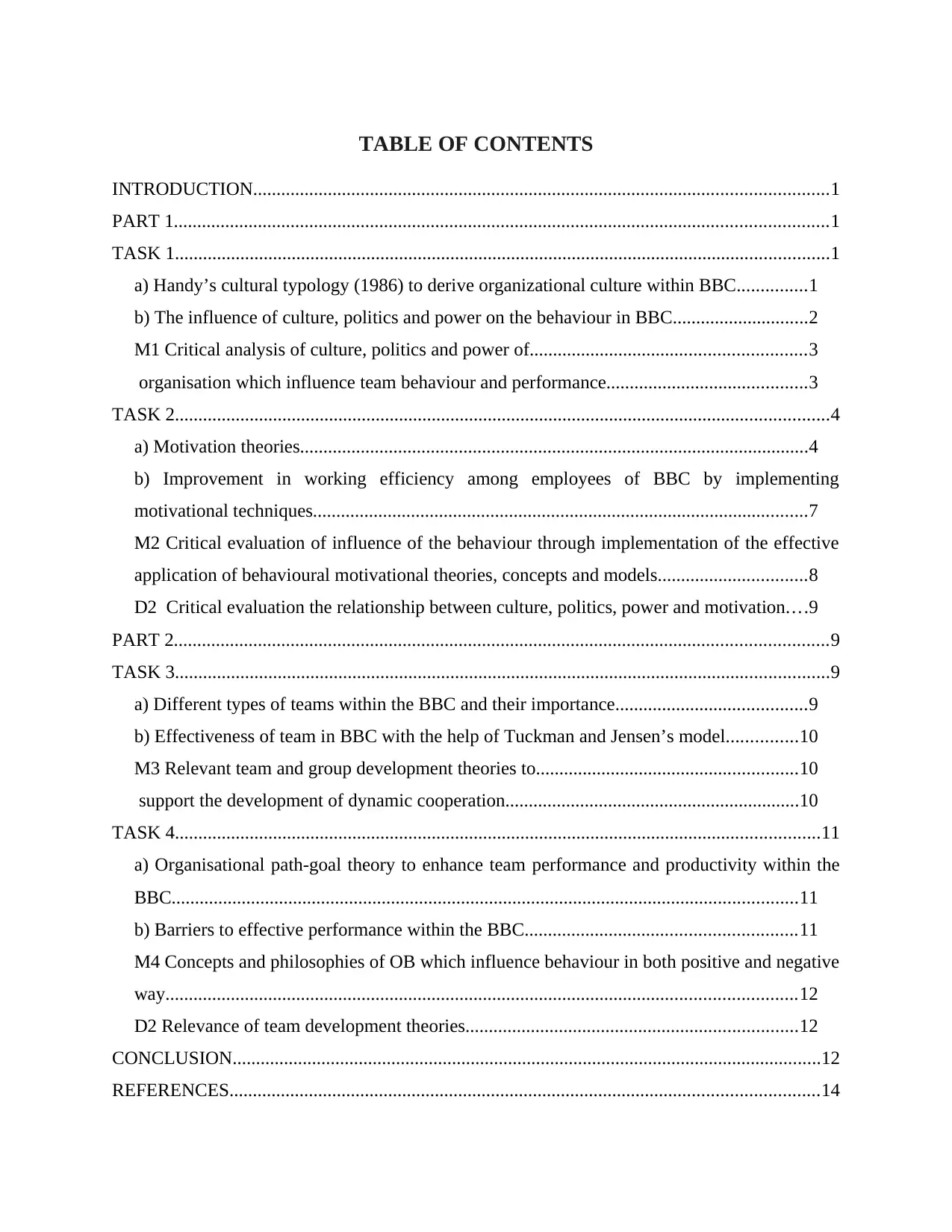
TABLE OF CONTENTS
INTRODUCTION...........................................................................................................................1
PART 1............................................................................................................................................1
TASK 1............................................................................................................................................1
a) Handy’s cultural typology (1986) to derive organizational culture within BBC...............1
b) The influence of culture, politics and power on the behaviour in BBC.............................2
M1 Critical analysis of culture, politics and power of...........................................................3
organisation which influence team behaviour and performance...........................................3
TASK 2............................................................................................................................................4
a) Motivation theories.............................................................................................................4
b) Improvement in working efficiency among employees of BBC by implementing
motivational techniques..........................................................................................................7
M2 Critical evaluation of influence of the behaviour through implementation of the effective
application of behavioural motivational theories, concepts and models................................8
D2 Critical evaluation the relationship between culture, politics, power and motivation....9
PART 2............................................................................................................................................9
TASK 3............................................................................................................................................9
a) Different types of teams within the BBC and their importance.........................................9
b) Effectiveness of team in BBC with the help of Tuckman and Jensen’s model...............10
M3 Relevant team and group development theories to........................................................10
support the development of dynamic cooperation...............................................................10
TASK 4..........................................................................................................................................11
a) Organisational path-goal theory to enhance team performance and productivity within the
BBC......................................................................................................................................11
b) Barriers to effective performance within the BBC..........................................................11
M4 Concepts and philosophies of OB which influence behaviour in both positive and negative
way.......................................................................................................................................12
D2 Relevance of team development theories.......................................................................12
CONCLUSION..............................................................................................................................12
REFERENCES..............................................................................................................................14
INTRODUCTION...........................................................................................................................1
PART 1............................................................................................................................................1
TASK 1............................................................................................................................................1
a) Handy’s cultural typology (1986) to derive organizational culture within BBC...............1
b) The influence of culture, politics and power on the behaviour in BBC.............................2
M1 Critical analysis of culture, politics and power of...........................................................3
organisation which influence team behaviour and performance...........................................3
TASK 2............................................................................................................................................4
a) Motivation theories.............................................................................................................4
b) Improvement in working efficiency among employees of BBC by implementing
motivational techniques..........................................................................................................7
M2 Critical evaluation of influence of the behaviour through implementation of the effective
application of behavioural motivational theories, concepts and models................................8
D2 Critical evaluation the relationship between culture, politics, power and motivation....9
PART 2............................................................................................................................................9
TASK 3............................................................................................................................................9
a) Different types of teams within the BBC and their importance.........................................9
b) Effectiveness of team in BBC with the help of Tuckman and Jensen’s model...............10
M3 Relevant team and group development theories to........................................................10
support the development of dynamic cooperation...............................................................10
TASK 4..........................................................................................................................................11
a) Organisational path-goal theory to enhance team performance and productivity within the
BBC......................................................................................................................................11
b) Barriers to effective performance within the BBC..........................................................11
M4 Concepts and philosophies of OB which influence behaviour in both positive and negative
way.......................................................................................................................................12
D2 Relevance of team development theories.......................................................................12
CONCLUSION..............................................................................................................................12
REFERENCES..............................................................................................................................14

⊘ This is a preview!⊘
Do you want full access?
Subscribe today to unlock all pages.

Trusted by 1+ million students worldwide
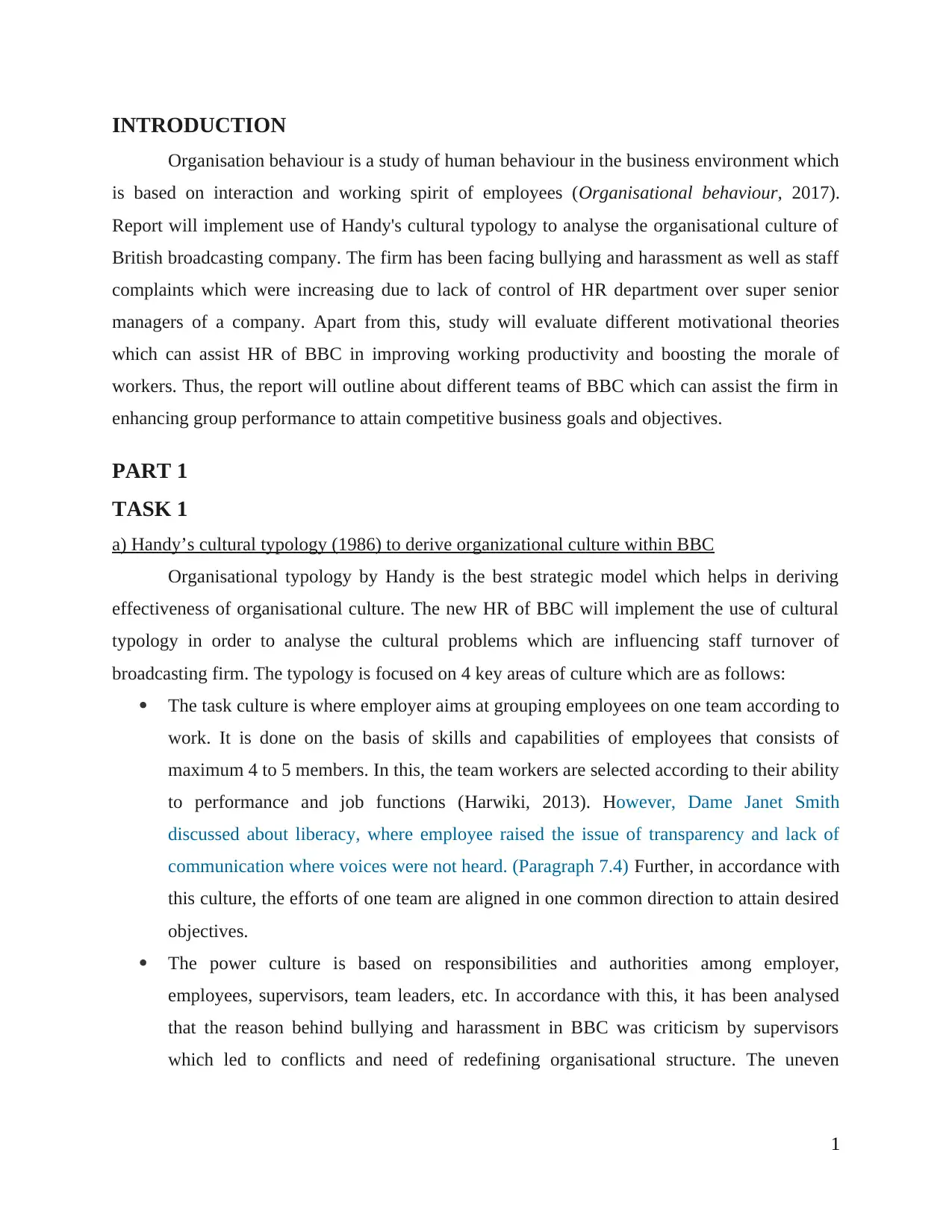
INTRODUCTION
Organisation behaviour is a study of human behaviour in the business environment which
is based on interaction and working spirit of employees (Organisational behaviour, 2017).
Report will implement use of Handy's cultural typology to analyse the organisational culture of
British broadcasting company. The firm has been facing bullying and harassment as well as staff
complaints which were increasing due to lack of control of HR department over super senior
managers of a company. Apart from this, study will evaluate different motivational theories
which can assist HR of BBC in improving working productivity and boosting the morale of
workers. Thus, the report will outline about different teams of BBC which can assist the firm in
enhancing group performance to attain competitive business goals and objectives.
PART 1
TASK 1
a) Handy’s cultural typology (1986) to derive organizational culture within BBC
Organisational typology by Handy is the best strategic model which helps in deriving
effectiveness of organisational culture. The new HR of BBC will implement the use of cultural
typology in order to analyse the cultural problems which are influencing staff turnover of
broadcasting firm. The typology is focused on 4 key areas of culture which are as follows:
The task culture is where employer aims at grouping employees on one team according to
work. It is done on the basis of skills and capabilities of employees that consists of
maximum 4 to 5 members. In this, the team workers are selected according to their ability
to performance and job functions (Harwiki, 2013). However, Dame Janet Smith
discussed about liberacy, where employee raised the issue of transparency and lack of
communication where voices were not heard. (Paragraph 7.4) Further, in accordance with
this culture, the efforts of one team are aligned in one common direction to attain desired
objectives.
The power culture is based on responsibilities and authorities among employer,
employees, supervisors, team leaders, etc. In accordance with this, it has been analysed
that the reason behind bullying and harassment in BBC was criticism by supervisors
which led to conflicts and need of redefining organisational structure. The uneven
1
Organisation behaviour is a study of human behaviour in the business environment which
is based on interaction and working spirit of employees (Organisational behaviour, 2017).
Report will implement use of Handy's cultural typology to analyse the organisational culture of
British broadcasting company. The firm has been facing bullying and harassment as well as staff
complaints which were increasing due to lack of control of HR department over super senior
managers of a company. Apart from this, study will evaluate different motivational theories
which can assist HR of BBC in improving working productivity and boosting the morale of
workers. Thus, the report will outline about different teams of BBC which can assist the firm in
enhancing group performance to attain competitive business goals and objectives.
PART 1
TASK 1
a) Handy’s cultural typology (1986) to derive organizational culture within BBC
Organisational typology by Handy is the best strategic model which helps in deriving
effectiveness of organisational culture. The new HR of BBC will implement the use of cultural
typology in order to analyse the cultural problems which are influencing staff turnover of
broadcasting firm. The typology is focused on 4 key areas of culture which are as follows:
The task culture is where employer aims at grouping employees on one team according to
work. It is done on the basis of skills and capabilities of employees that consists of
maximum 4 to 5 members. In this, the team workers are selected according to their ability
to performance and job functions (Harwiki, 2013). However, Dame Janet Smith
discussed about liberacy, where employee raised the issue of transparency and lack of
communication where voices were not heard. (Paragraph 7.4) Further, in accordance with
this culture, the efforts of one team are aligned in one common direction to attain desired
objectives.
The power culture is based on responsibilities and authorities among employer,
employees, supervisors, team leaders, etc. In accordance with this, it has been analysed
that the reason behind bullying and harassment in BBC was criticism by supervisors
which led to conflicts and need of redefining organisational structure. The uneven
1
Paraphrase This Document
Need a fresh take? Get an instant paraphrase of this document with our AI Paraphraser
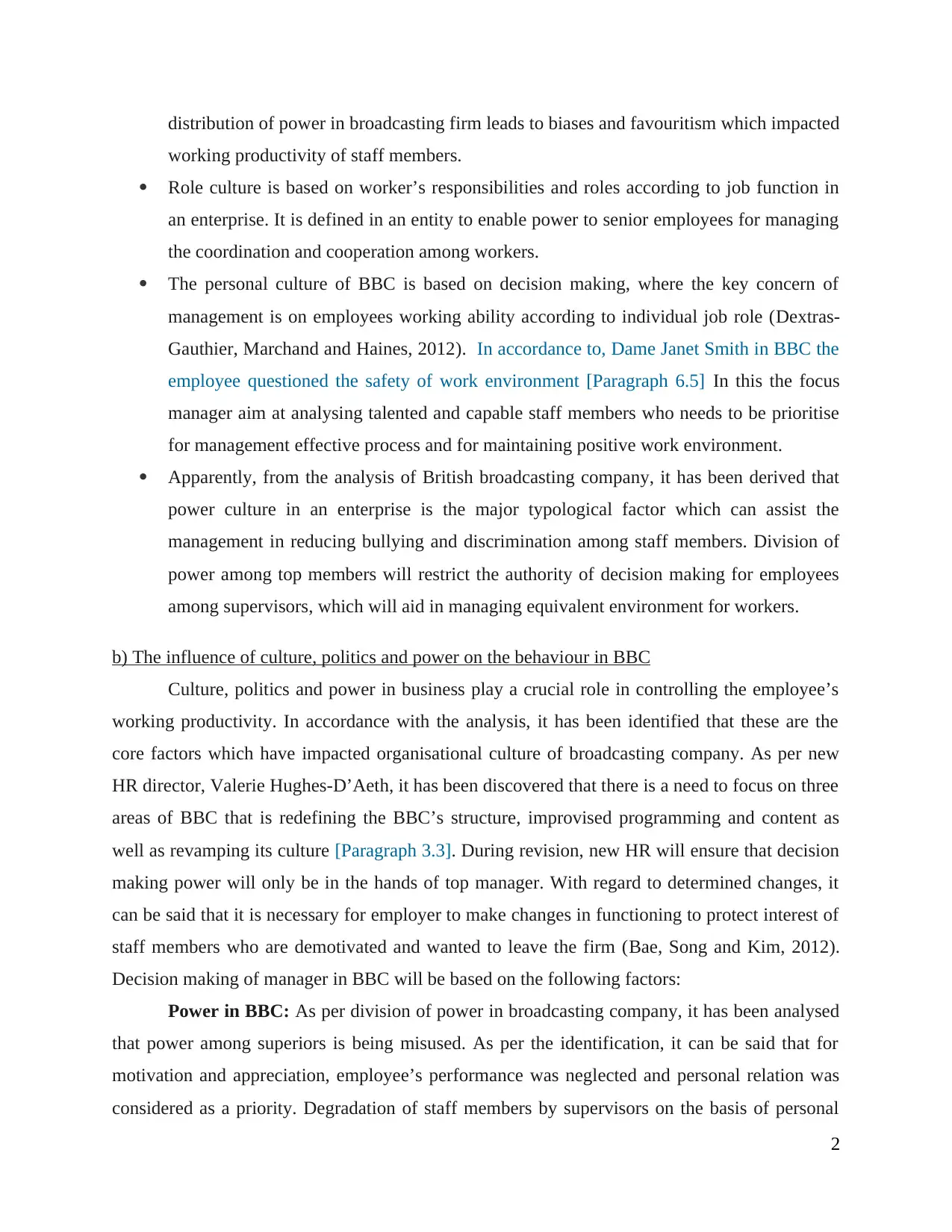
distribution of power in broadcasting firm leads to biases and favouritism which impacted
working productivity of staff members.
Role culture is based on worker’s responsibilities and roles according to job function in
an enterprise. It is defined in an entity to enable power to senior employees for managing
the coordination and cooperation among workers.
The personal culture of BBC is based on decision making, where the key concern of
management is on employees working ability according to individual job role (Dextras-
Gauthier, Marchand and Haines, 2012). In accordance to, Dame Janet Smith in BBC the
employee questioned the safety of work environment [Paragraph 6.5] In this the focus
manager aim at analysing talented and capable staff members who needs to be prioritise
for management effective process and for maintaining positive work environment.
Apparently, from the analysis of British broadcasting company, it has been derived that
power culture in an enterprise is the major typological factor which can assist the
management in reducing bullying and discrimination among staff members. Division of
power among top members will restrict the authority of decision making for employees
among supervisors, which will aid in managing equivalent environment for workers.
b) The influence of culture, politics and power on the behaviour in BBC
Culture, politics and power in business play a crucial role in controlling the employee’s
working productivity. In accordance with the analysis, it has been identified that these are the
core factors which have impacted organisational culture of broadcasting company. As per new
HR director, Valerie Hughes-D’Aeth, it has been discovered that there is a need to focus on three
areas of BBC that is redefining the BBC’s structure, improvised programming and content as
well as revamping its culture [Paragraph 3.3]. During revision, new HR will ensure that decision
making power will only be in the hands of top manager. With regard to determined changes, it
can be said that it is necessary for employer to make changes in functioning to protect interest of
staff members who are demotivated and wanted to leave the firm (Bae, Song and Kim, 2012).
Decision making of manager in BBC will be based on the following factors:
Power in BBC: As per division of power in broadcasting company, it has been analysed
that power among superiors is being misused. As per the identification, it can be said that for
motivation and appreciation, employee’s performance was neglected and personal relation was
considered as a priority. Degradation of staff members by supervisors on the basis of personal
2
working productivity of staff members.
Role culture is based on worker’s responsibilities and roles according to job function in
an enterprise. It is defined in an entity to enable power to senior employees for managing
the coordination and cooperation among workers.
The personal culture of BBC is based on decision making, where the key concern of
management is on employees working ability according to individual job role (Dextras-
Gauthier, Marchand and Haines, 2012). In accordance to, Dame Janet Smith in BBC the
employee questioned the safety of work environment [Paragraph 6.5] In this the focus
manager aim at analysing talented and capable staff members who needs to be prioritise
for management effective process and for maintaining positive work environment.
Apparently, from the analysis of British broadcasting company, it has been derived that
power culture in an enterprise is the major typological factor which can assist the
management in reducing bullying and discrimination among staff members. Division of
power among top members will restrict the authority of decision making for employees
among supervisors, which will aid in managing equivalent environment for workers.
b) The influence of culture, politics and power on the behaviour in BBC
Culture, politics and power in business play a crucial role in controlling the employee’s
working productivity. In accordance with the analysis, it has been identified that these are the
core factors which have impacted organisational culture of broadcasting company. As per new
HR director, Valerie Hughes-D’Aeth, it has been discovered that there is a need to focus on three
areas of BBC that is redefining the BBC’s structure, improvised programming and content as
well as revamping its culture [Paragraph 3.3]. During revision, new HR will ensure that decision
making power will only be in the hands of top manager. With regard to determined changes, it
can be said that it is necessary for employer to make changes in functioning to protect interest of
staff members who are demotivated and wanted to leave the firm (Bae, Song and Kim, 2012).
Decision making of manager in BBC will be based on the following factors:
Power in BBC: As per division of power in broadcasting company, it has been analysed
that power among superiors is being misused. As per the identification, it can be said that for
motivation and appreciation, employee’s performance was neglected and personal relation was
considered as a priority. Degradation of staff members by supervisors on the basis of personal
2
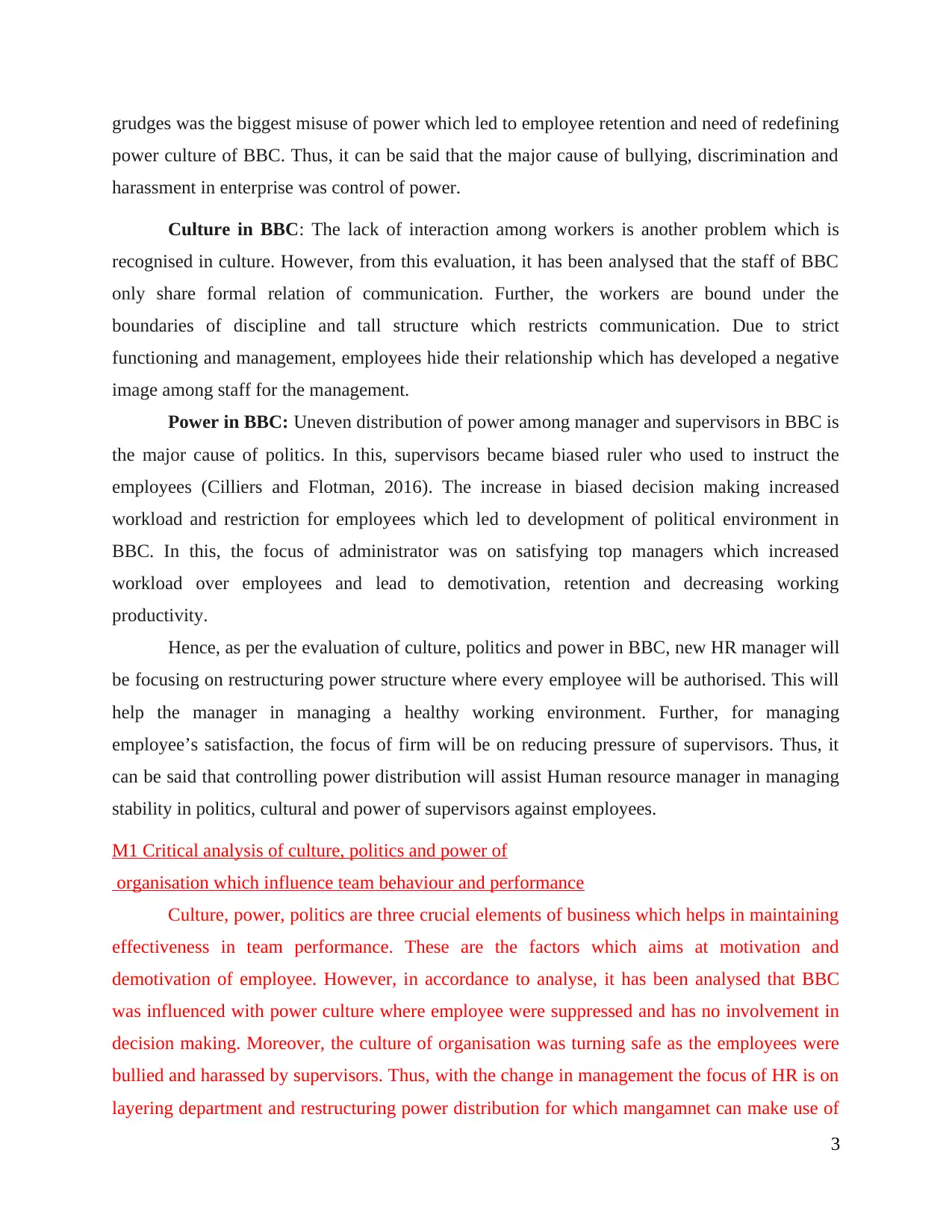
grudges was the biggest misuse of power which led to employee retention and need of redefining
power culture of BBC. Thus, it can be said that the major cause of bullying, discrimination and
harassment in enterprise was control of power.
Culture in BBC: The lack of interaction among workers is another problem which is
recognised in culture. However, from this evaluation, it has been analysed that the staff of BBC
only share formal relation of communication. Further, the workers are bound under the
boundaries of discipline and tall structure which restricts communication. Due to strict
functioning and management, employees hide their relationship which has developed a negative
image among staff for the management.
Power in BBC: Uneven distribution of power among manager and supervisors in BBC is
the major cause of politics. In this, supervisors became biased ruler who used to instruct the
employees (Cilliers and Flotman, 2016). The increase in biased decision making increased
workload and restriction for employees which led to development of political environment in
BBC. In this, the focus of administrator was on satisfying top managers which increased
workload over employees and lead to demotivation, retention and decreasing working
productivity.
Hence, as per the evaluation of culture, politics and power in BBC, new HR manager will
be focusing on restructuring power structure where every employee will be authorised. This will
help the manager in managing a healthy working environment. Further, for managing
employee’s satisfaction, the focus of firm will be on reducing pressure of supervisors. Thus, it
can be said that controlling power distribution will assist Human resource manager in managing
stability in politics, cultural and power of supervisors against employees.
M1 Critical analysis of culture, politics and power of
organisation which influence team behaviour and performance
Culture, power, politics are three crucial elements of business which helps in maintaining
effectiveness in team performance. These are the factors which aims at motivation and
demotivation of employee. However, in accordance to analyse, it has been analysed that BBC
was influenced with power culture where employee were suppressed and has no involvement in
decision making. Moreover, the culture of organisation was turning safe as the employees were
bullied and harassed by supervisors. Thus, with the change in management the focus of HR is on
layering department and restructuring power distribution for which mangamnet can make use of
3
power culture of BBC. Thus, it can be said that the major cause of bullying, discrimination and
harassment in enterprise was control of power.
Culture in BBC: The lack of interaction among workers is another problem which is
recognised in culture. However, from this evaluation, it has been analysed that the staff of BBC
only share formal relation of communication. Further, the workers are bound under the
boundaries of discipline and tall structure which restricts communication. Due to strict
functioning and management, employees hide their relationship which has developed a negative
image among staff for the management.
Power in BBC: Uneven distribution of power among manager and supervisors in BBC is
the major cause of politics. In this, supervisors became biased ruler who used to instruct the
employees (Cilliers and Flotman, 2016). The increase in biased decision making increased
workload and restriction for employees which led to development of political environment in
BBC. In this, the focus of administrator was on satisfying top managers which increased
workload over employees and lead to demotivation, retention and decreasing working
productivity.
Hence, as per the evaluation of culture, politics and power in BBC, new HR manager will
be focusing on restructuring power structure where every employee will be authorised. This will
help the manager in managing a healthy working environment. Further, for managing
employee’s satisfaction, the focus of firm will be on reducing pressure of supervisors. Thus, it
can be said that controlling power distribution will assist Human resource manager in managing
stability in politics, cultural and power of supervisors against employees.
M1 Critical analysis of culture, politics and power of
organisation which influence team behaviour and performance
Culture, power, politics are three crucial elements of business which helps in maintaining
effectiveness in team performance. These are the factors which aims at motivation and
demotivation of employee. However, in accordance to analyse, it has been analysed that BBC
was influenced with power culture where employee were suppressed and has no involvement in
decision making. Moreover, the culture of organisation was turning safe as the employees were
bullied and harassed by supervisors. Thus, with the change in management the focus of HR is on
layering department and restructuring power distribution for which mangamnet can make use of
3
⊘ This is a preview!⊘
Do you want full access?
Subscribe today to unlock all pages.

Trusted by 1+ million students worldwide
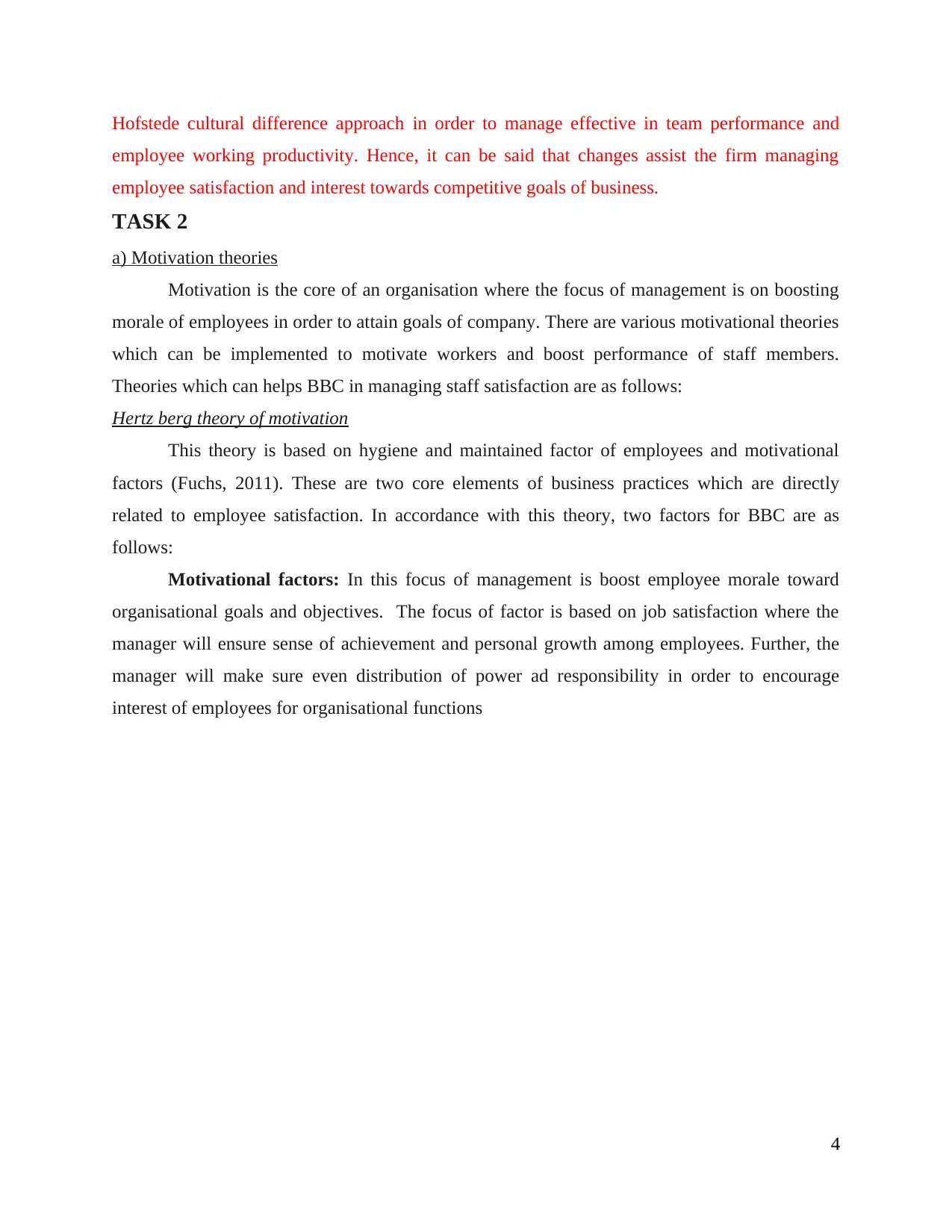
Hofstede cultural difference approach in order to manage effective in team performance and
employee working productivity. Hence, it can be said that changes assist the firm managing
employee satisfaction and interest towards competitive goals of business.
TASK 2
a) Motivation theories
Motivation is the core of an organisation where the focus of management is on boosting
morale of employees in order to attain goals of company. There are various motivational theories
which can be implemented to motivate workers and boost performance of staff members.
Theories which can helps BBC in managing staff satisfaction are as follows:
Hertz berg theory of motivation
This theory is based on hygiene and maintained factor of employees and motivational
factors (Fuchs, 2011). These are two core elements of business practices which are directly
related to employee satisfaction. In accordance with this theory, two factors for BBC are as
follows:
Motivational factors: In this focus of management is boost employee morale toward
organisational goals and objectives. The focus of factor is based on job satisfaction where the
manager will ensure sense of achievement and personal growth among employees. Further, the
manager will make sure even distribution of power ad responsibility in order to encourage
interest of employees for organisational functions
4
employee working productivity. Hence, it can be said that changes assist the firm managing
employee satisfaction and interest towards competitive goals of business.
TASK 2
a) Motivation theories
Motivation is the core of an organisation where the focus of management is on boosting
morale of employees in order to attain goals of company. There are various motivational theories
which can be implemented to motivate workers and boost performance of staff members.
Theories which can helps BBC in managing staff satisfaction are as follows:
Hertz berg theory of motivation
This theory is based on hygiene and maintained factor of employees and motivational
factors (Fuchs, 2011). These are two core elements of business practices which are directly
related to employee satisfaction. In accordance with this theory, two factors for BBC are as
follows:
Motivational factors: In this focus of management is boost employee morale toward
organisational goals and objectives. The focus of factor is based on job satisfaction where the
manager will ensure sense of achievement and personal growth among employees. Further, the
manager will make sure even distribution of power ad responsibility in order to encourage
interest of employees for organisational functions
4
Paraphrase This Document
Need a fresh take? Get an instant paraphrase of this document with our AI Paraphraser
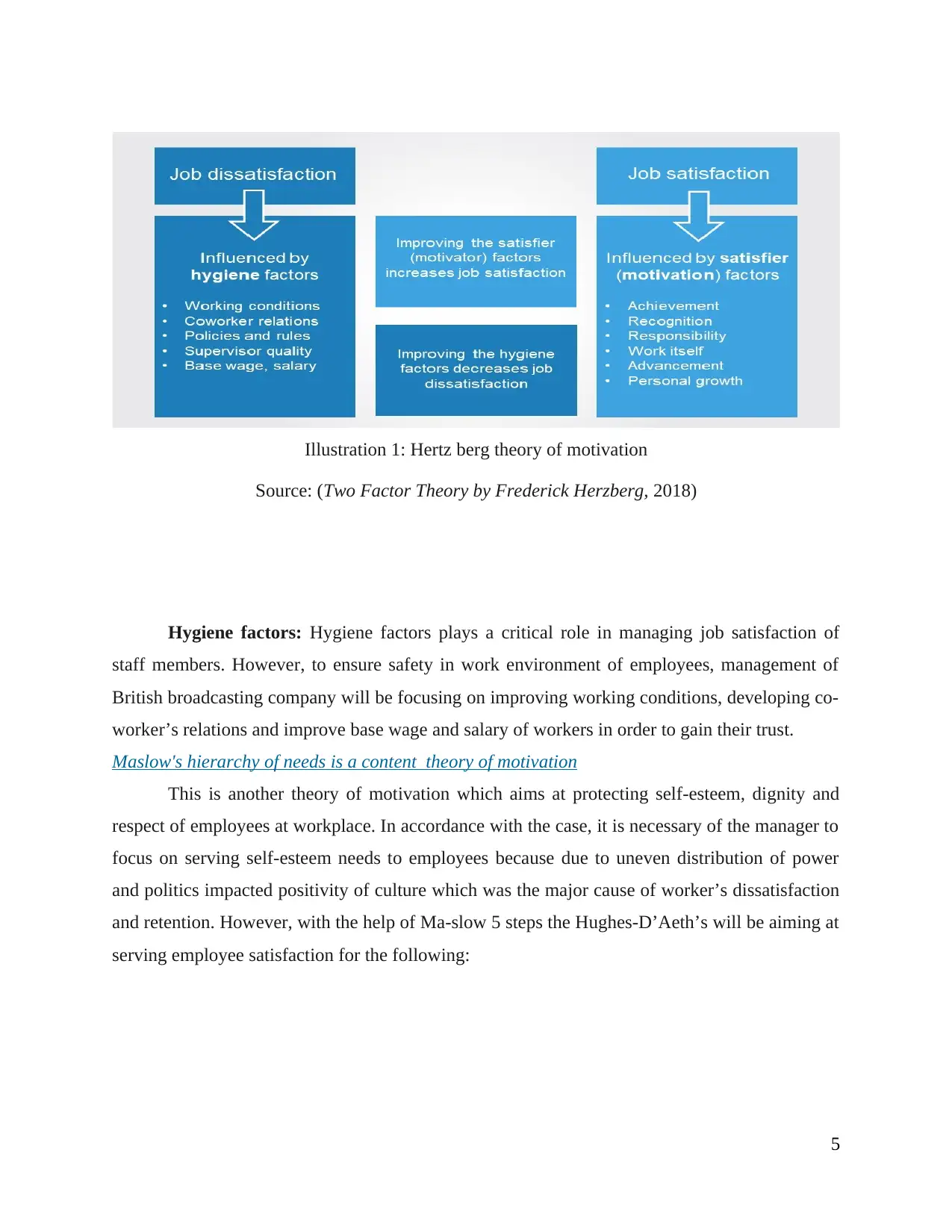
Hygiene factors: Hygiene factors plays a critical role in managing job satisfaction of
staff members. However, to ensure safety in work environment of employees, management of
British broadcasting company will be focusing on improving working conditions, developing co-
worker’s relations and improve base wage and salary of workers in order to gain their trust.
Maslow's hierarchy of needs is a content theory of motivation
This is another theory of motivation which aims at protecting self-esteem, dignity and
respect of employees at workplace. In accordance with the case, it is necessary of the manager to
focus on serving self-esteem needs to employees because due to uneven distribution of power
and politics impacted positivity of culture which was the major cause of worker’s dissatisfaction
and retention. However, with the help of Ma-slow 5 steps the Hughes-D’Aeth’s will be aiming at
serving employee satisfaction for the following:
5
Illustration 1: Hertz berg theory of motivation
Source: (Two Factor Theory by Frederick Herzberg, 2018)
staff members. However, to ensure safety in work environment of employees, management of
British broadcasting company will be focusing on improving working conditions, developing co-
worker’s relations and improve base wage and salary of workers in order to gain their trust.
Maslow's hierarchy of needs is a content theory of motivation
This is another theory of motivation which aims at protecting self-esteem, dignity and
respect of employees at workplace. In accordance with the case, it is necessary of the manager to
focus on serving self-esteem needs to employees because due to uneven distribution of power
and politics impacted positivity of culture which was the major cause of worker’s dissatisfaction
and retention. However, with the help of Ma-slow 5 steps the Hughes-D’Aeth’s will be aiming at
serving employee satisfaction for the following:
5
Illustration 1: Hertz berg theory of motivation
Source: (Two Factor Theory by Frederick Herzberg, 2018)
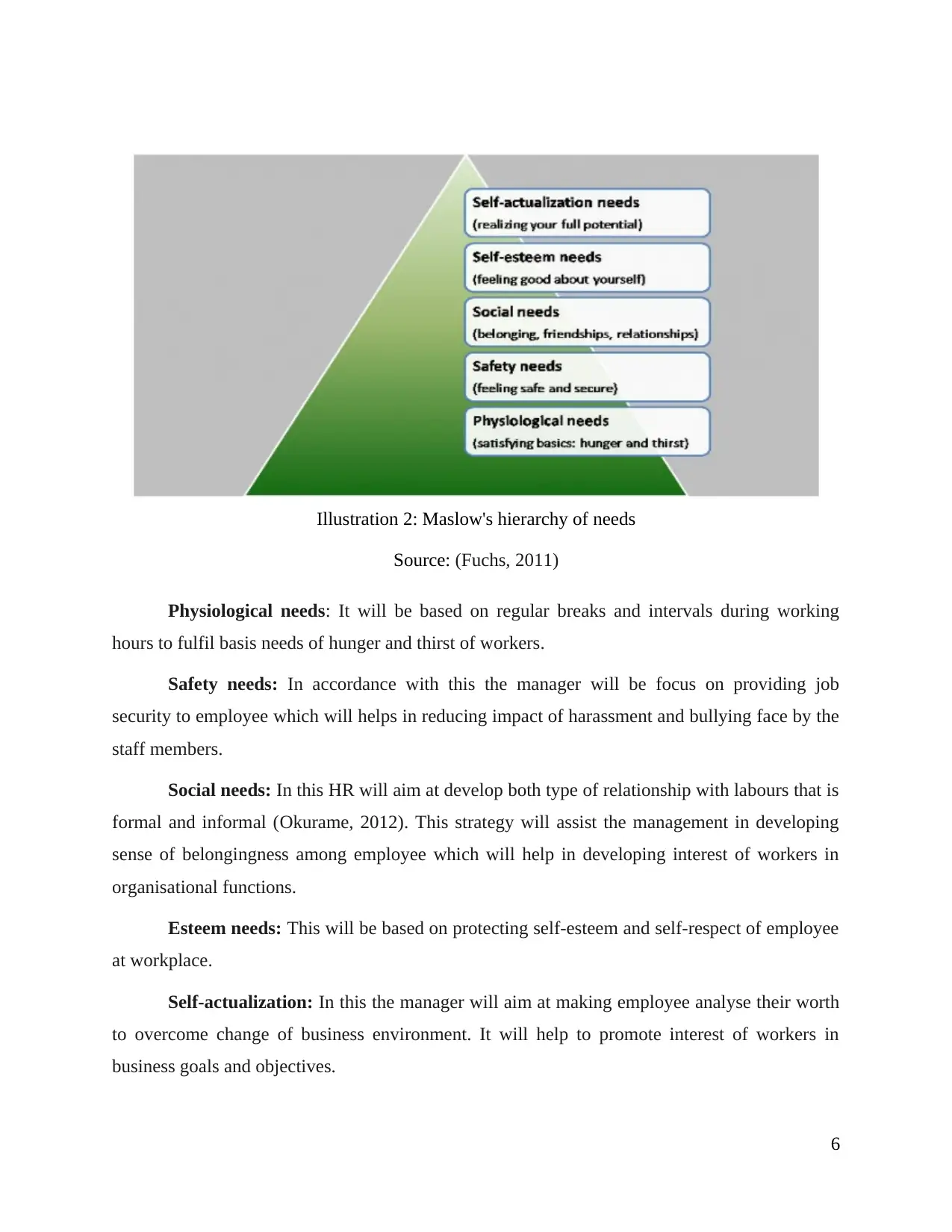
Physiological needs: It will be based on regular breaks and intervals during working
hours to fulfil basis needs of hunger and thirst of workers.
Safety needs: In accordance with this the manager will be focus on providing job
security to employee which will helps in reducing impact of harassment and bullying face by the
staff members.
Social needs: In this HR will aim at develop both type of relationship with labours that is
formal and informal (Okurame, 2012). This strategy will assist the management in developing
sense of belongingness among employee which will help in developing interest of workers in
organisational functions.
Esteem needs: This will be based on protecting self-esteem and self-respect of employee
at workplace.
Self-actualization: In this the manager will aim at making employee analyse their worth
to overcome change of business environment. It will help to promote interest of workers in
business goals and objectives.
6
Illustration 2: Maslow's hierarchy of needs
Source: (Fuchs, 2011)
hours to fulfil basis needs of hunger and thirst of workers.
Safety needs: In accordance with this the manager will be focus on providing job
security to employee which will helps in reducing impact of harassment and bullying face by the
staff members.
Social needs: In this HR will aim at develop both type of relationship with labours that is
formal and informal (Okurame, 2012). This strategy will assist the management in developing
sense of belongingness among employee which will help in developing interest of workers in
organisational functions.
Esteem needs: This will be based on protecting self-esteem and self-respect of employee
at workplace.
Self-actualization: In this the manager will aim at making employee analyse their worth
to overcome change of business environment. It will help to promote interest of workers in
business goals and objectives.
6
Illustration 2: Maslow's hierarchy of needs
Source: (Fuchs, 2011)
⊘ This is a preview!⊘
Do you want full access?
Subscribe today to unlock all pages.

Trusted by 1+ million students worldwide
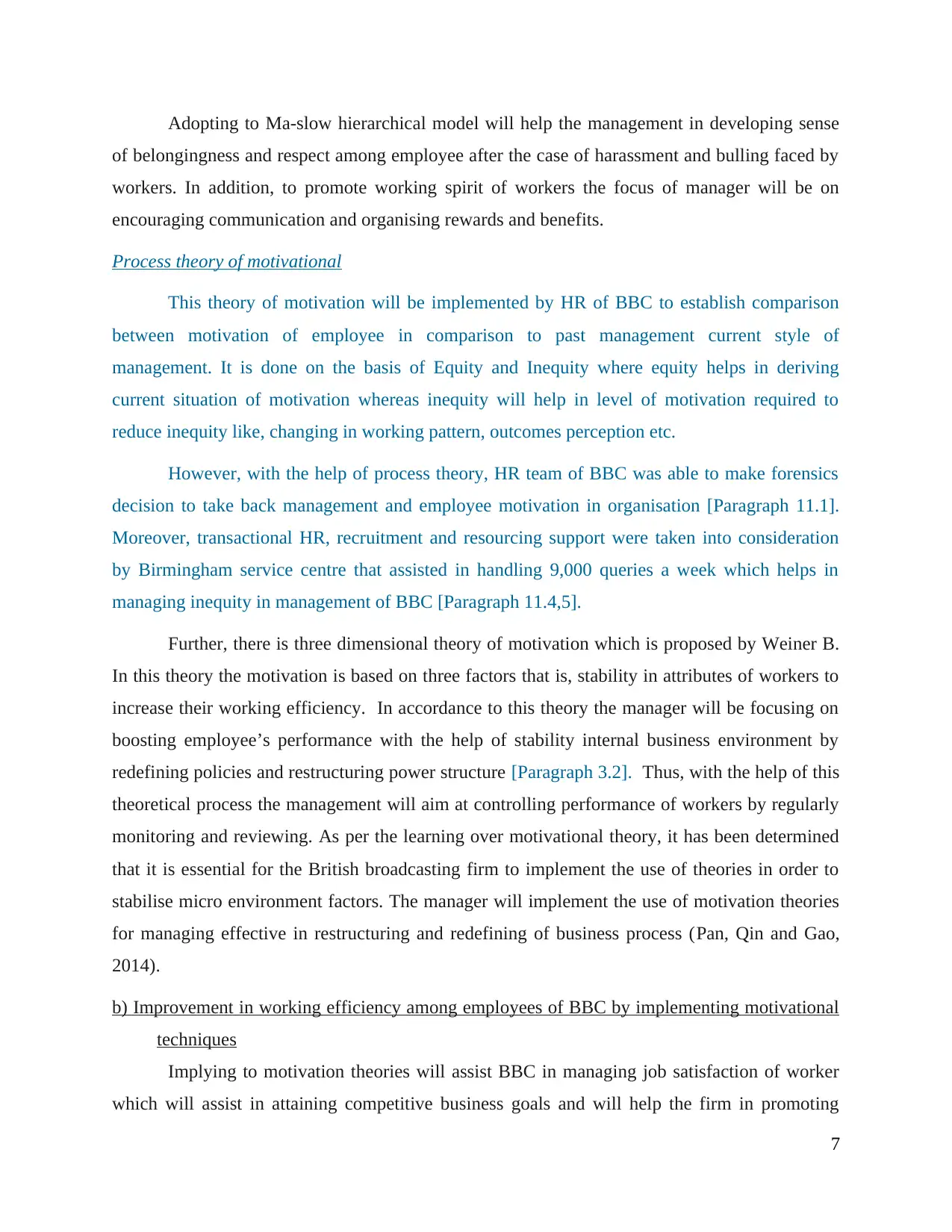
Adopting to Ma-slow hierarchical model will help the management in developing sense
of belongingness and respect among employee after the case of harassment and bulling faced by
workers. In addition, to promote working spirit of workers the focus of manager will be on
encouraging communication and organising rewards and benefits.
Process theory of motivational
This theory of motivation will be implemented by HR of BBC to establish comparison
between motivation of employee in comparison to past management current style of
management. It is done on the basis of Equity and Inequity where equity helps in deriving
current situation of motivation whereas inequity will help in level of motivation required to
reduce inequity like, changing in working pattern, outcomes perception etc.
However, with the help of process theory, HR team of BBC was able to make forensics
decision to take back management and employee motivation in organisation [Paragraph 11.1].
Moreover, transactional HR, recruitment and resourcing support were taken into consideration
by Birmingham service centre that assisted in handling 9,000 queries a week which helps in
managing inequity in management of BBC [Paragraph 11.4,5].
Further, there is three dimensional theory of motivation which is proposed by Weiner B.
In this theory the motivation is based on three factors that is, stability in attributes of workers to
increase their working efficiency. In accordance to this theory the manager will be focusing on
boosting employee’s performance with the help of stability internal business environment by
redefining policies and restructuring power structure [Paragraph 3.2]. Thus, with the help of this
theoretical process the management will aim at controlling performance of workers by regularly
monitoring and reviewing. As per the learning over motivational theory, it has been determined
that it is essential for the British broadcasting firm to implement the use of theories in order to
stabilise micro environment factors. The manager will implement the use of motivation theories
for managing effective in restructuring and redefining of business process (Pan, Qin and Gao,
2014).
b) Improvement in working efficiency among employees of BBC by implementing motivational
techniques
Implying to motivation theories will assist BBC in managing job satisfaction of worker
which will assist in attaining competitive business goals and will help the firm in promoting
7
of belongingness and respect among employee after the case of harassment and bulling faced by
workers. In addition, to promote working spirit of workers the focus of manager will be on
encouraging communication and organising rewards and benefits.
Process theory of motivational
This theory of motivation will be implemented by HR of BBC to establish comparison
between motivation of employee in comparison to past management current style of
management. It is done on the basis of Equity and Inequity where equity helps in deriving
current situation of motivation whereas inequity will help in level of motivation required to
reduce inequity like, changing in working pattern, outcomes perception etc.
However, with the help of process theory, HR team of BBC was able to make forensics
decision to take back management and employee motivation in organisation [Paragraph 11.1].
Moreover, transactional HR, recruitment and resourcing support were taken into consideration
by Birmingham service centre that assisted in handling 9,000 queries a week which helps in
managing inequity in management of BBC [Paragraph 11.4,5].
Further, there is three dimensional theory of motivation which is proposed by Weiner B.
In this theory the motivation is based on three factors that is, stability in attributes of workers to
increase their working efficiency. In accordance to this theory the manager will be focusing on
boosting employee’s performance with the help of stability internal business environment by
redefining policies and restructuring power structure [Paragraph 3.2]. Thus, with the help of this
theoretical process the management will aim at controlling performance of workers by regularly
monitoring and reviewing. As per the learning over motivational theory, it has been determined
that it is essential for the British broadcasting firm to implement the use of theories in order to
stabilise micro environment factors. The manager will implement the use of motivation theories
for managing effective in restructuring and redefining of business process (Pan, Qin and Gao,
2014).
b) Improvement in working efficiency among employees of BBC by implementing motivational
techniques
Implying to motivation theories will assist BBC in managing job satisfaction of worker
which will assist in attaining competitive business goals and will help the firm in promoting
7
Paraphrase This Document
Need a fresh take? Get an instant paraphrase of this document with our AI Paraphraser
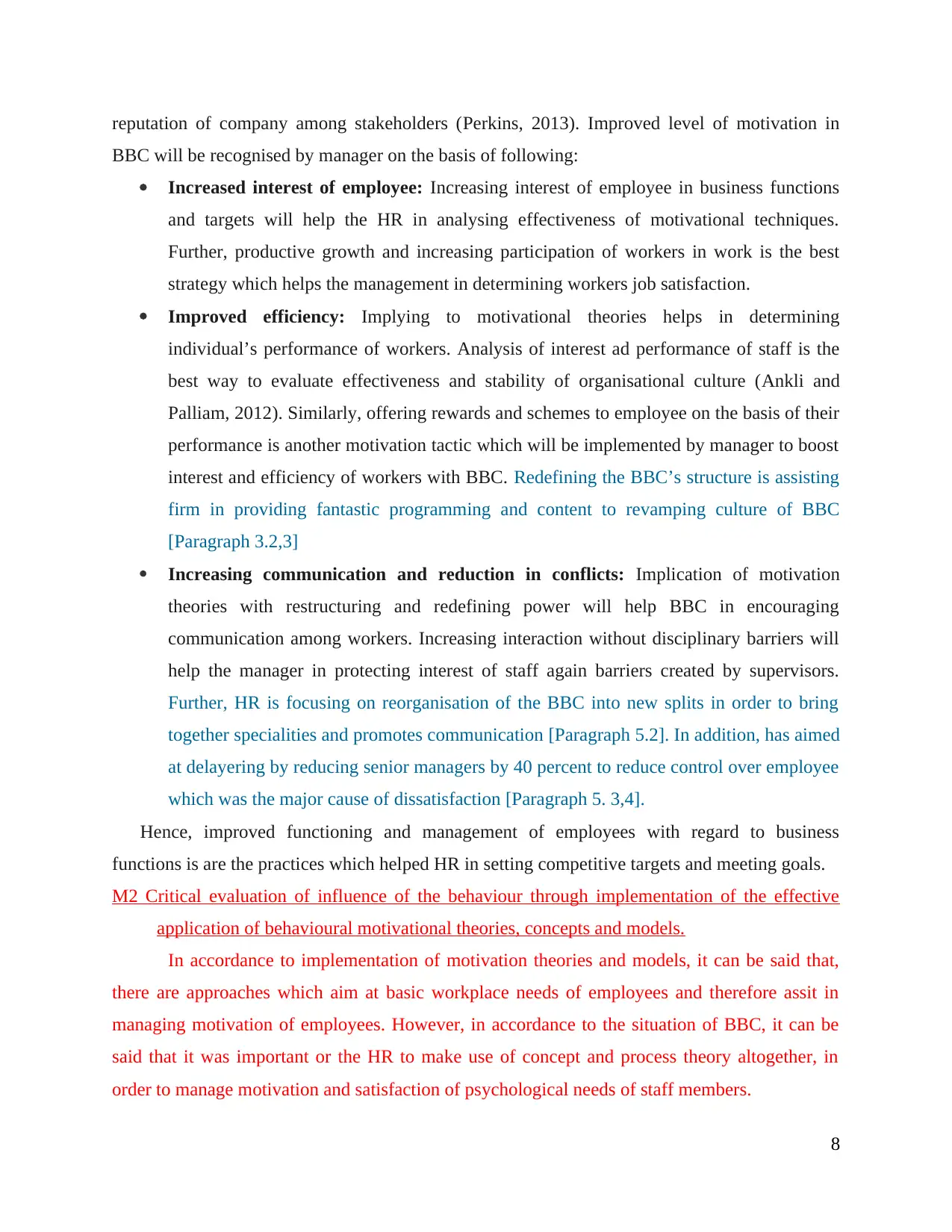
reputation of company among stakeholders (Perkins, 2013). Improved level of motivation in
BBC will be recognised by manager on the basis of following:
Increased interest of employee: Increasing interest of employee in business functions
and targets will help the HR in analysing effectiveness of motivational techniques.
Further, productive growth and increasing participation of workers in work is the best
strategy which helps the management in determining workers job satisfaction.
Improved efficiency: Implying to motivational theories helps in determining
individual’s performance of workers. Analysis of interest ad performance of staff is the
best way to evaluate effectiveness and stability of organisational culture (Ankli and
Palliam, 2012). Similarly, offering rewards and schemes to employee on the basis of their
performance is another motivation tactic which will be implemented by manager to boost
interest and efficiency of workers with BBC. Redefining the BBC’s structure is assisting
firm in providing fantastic programming and content to revamping culture of BBC
[Paragraph 3.2,3]
Increasing communication and reduction in conflicts: Implication of motivation
theories with restructuring and redefining power will help BBC in encouraging
communication among workers. Increasing interaction without disciplinary barriers will
help the manager in protecting interest of staff again barriers created by supervisors.
Further, HR is focusing on reorganisation of the BBC into new splits in order to bring
together specialities and promotes communication [Paragraph 5.2]. In addition, has aimed
at delayering by reducing senior managers by 40 percent to reduce control over employee
which was the major cause of dissatisfaction [Paragraph 5. 3,4].
Hence, improved functioning and management of employees with regard to business
functions is are the practices which helped HR in setting competitive targets and meeting goals.
M2 Critical evaluation of influence of the behaviour through implementation of the effective
application of behavioural motivational theories, concepts and models.
In accordance to implementation of motivation theories and models, it can be said that,
there are approaches which aim at basic workplace needs of employees and therefore assit in
managing motivation of employees. However, in accordance to the situation of BBC, it can be
said that it was important or the HR to make use of concept and process theory altogether, in
order to manage motivation and satisfaction of psychological needs of staff members.
8
BBC will be recognised by manager on the basis of following:
Increased interest of employee: Increasing interest of employee in business functions
and targets will help the HR in analysing effectiveness of motivational techniques.
Further, productive growth and increasing participation of workers in work is the best
strategy which helps the management in determining workers job satisfaction.
Improved efficiency: Implying to motivational theories helps in determining
individual’s performance of workers. Analysis of interest ad performance of staff is the
best way to evaluate effectiveness and stability of organisational culture (Ankli and
Palliam, 2012). Similarly, offering rewards and schemes to employee on the basis of their
performance is another motivation tactic which will be implemented by manager to boost
interest and efficiency of workers with BBC. Redefining the BBC’s structure is assisting
firm in providing fantastic programming and content to revamping culture of BBC
[Paragraph 3.2,3]
Increasing communication and reduction in conflicts: Implication of motivation
theories with restructuring and redefining power will help BBC in encouraging
communication among workers. Increasing interaction without disciplinary barriers will
help the manager in protecting interest of staff again barriers created by supervisors.
Further, HR is focusing on reorganisation of the BBC into new splits in order to bring
together specialities and promotes communication [Paragraph 5.2]. In addition, has aimed
at delayering by reducing senior managers by 40 percent to reduce control over employee
which was the major cause of dissatisfaction [Paragraph 5. 3,4].
Hence, improved functioning and management of employees with regard to business
functions is are the practices which helped HR in setting competitive targets and meeting goals.
M2 Critical evaluation of influence of the behaviour through implementation of the effective
application of behavioural motivational theories, concepts and models.
In accordance to implementation of motivation theories and models, it can be said that,
there are approaches which aim at basic workplace needs of employees and therefore assit in
managing motivation of employees. However, in accordance to the situation of BBC, it can be
said that it was important or the HR to make use of concept and process theory altogether, in
order to manage motivation and satisfaction of psychological needs of staff members.
8
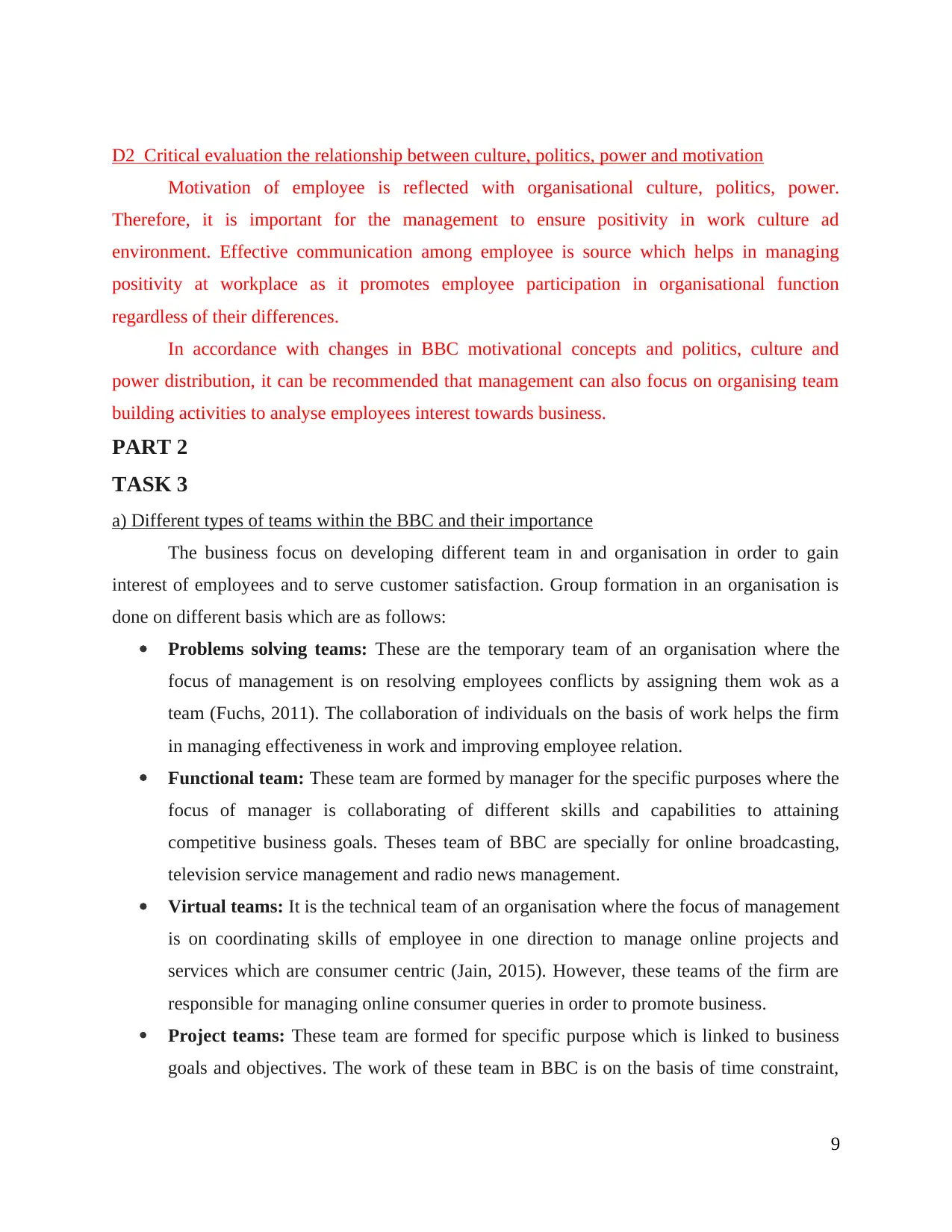
D2 Critical evaluation the relationship between culture, politics, power and motivation
Motivation of employee is reflected with organisational culture, politics, power.
Therefore, it is important for the management to ensure positivity in work culture ad
environment. Effective communication among employee is source which helps in managing
positivity at workplace as it promotes employee participation in organisational function
regardless of their differences.
In accordance with changes in BBC motivational concepts and politics, culture and
power distribution, it can be recommended that management can also focus on organising team
building activities to analyse employees interest towards business.
PART 2
TASK 3
a) Different types of teams within the BBC and their importance
The business focus on developing different team in and organisation in order to gain
interest of employees and to serve customer satisfaction. Group formation in an organisation is
done on different basis which are as follows:
Problems solving teams: These are the temporary team of an organisation where the
focus of management is on resolving employees conflicts by assigning them wok as a
team (Fuchs, 2011). The collaboration of individuals on the basis of work helps the firm
in managing effectiveness in work and improving employee relation.
Functional team: These team are formed by manager for the specific purposes where the
focus of manager is collaborating of different skills and capabilities to attaining
competitive business goals. Theses team of BBC are specially for online broadcasting,
television service management and radio news management.
Virtual teams: It is the technical team of an organisation where the focus of management
is on coordinating skills of employee in one direction to manage online projects and
services which are consumer centric (Jain, 2015). However, these teams of the firm are
responsible for managing online consumer queries in order to promote business.
Project teams: These team are formed for specific purpose which is linked to business
goals and objectives. The work of these team in BBC is on the basis of time constraint,
9
Motivation of employee is reflected with organisational culture, politics, power.
Therefore, it is important for the management to ensure positivity in work culture ad
environment. Effective communication among employee is source which helps in managing
positivity at workplace as it promotes employee participation in organisational function
regardless of their differences.
In accordance with changes in BBC motivational concepts and politics, culture and
power distribution, it can be recommended that management can also focus on organising team
building activities to analyse employees interest towards business.
PART 2
TASK 3
a) Different types of teams within the BBC and their importance
The business focus on developing different team in and organisation in order to gain
interest of employees and to serve customer satisfaction. Group formation in an organisation is
done on different basis which are as follows:
Problems solving teams: These are the temporary team of an organisation where the
focus of management is on resolving employees conflicts by assigning them wok as a
team (Fuchs, 2011). The collaboration of individuals on the basis of work helps the firm
in managing effectiveness in work and improving employee relation.
Functional team: These team are formed by manager for the specific purposes where the
focus of manager is collaborating of different skills and capabilities to attaining
competitive business goals. Theses team of BBC are specially for online broadcasting,
television service management and radio news management.
Virtual teams: It is the technical team of an organisation where the focus of management
is on coordinating skills of employee in one direction to manage online projects and
services which are consumer centric (Jain, 2015). However, these teams of the firm are
responsible for managing online consumer queries in order to promote business.
Project teams: These team are formed for specific purpose which is linked to business
goals and objectives. The work of these team in BBC is on the basis of time constraint,
9
⊘ This is a preview!⊘
Do you want full access?
Subscribe today to unlock all pages.

Trusted by 1+ million students worldwide
1 out of 18
Related Documents
Your All-in-One AI-Powered Toolkit for Academic Success.
+13062052269
info@desklib.com
Available 24*7 on WhatsApp / Email
![[object Object]](/_next/static/media/star-bottom.7253800d.svg)
Unlock your academic potential
Copyright © 2020–2026 A2Z Services. All Rights Reserved. Developed and managed by ZUCOL.





